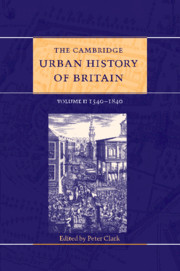Book contents
- Frontmatter
- 1 Introduction
- Part I Area surveys 1540–1840
- Part II Urban themes and types 1540–1700
- 5 Towns in an agrarian economy 1540–1700
- 6 Population and disease, estrangement and belonging 1540–1700
- 7 Politics and government 1540–1700
- 8 Reformation and culture 1540–1700
- 9 The urban landscape 1540–1700
- 10 London 1540–1700
- 11 Great and good towns 1540–1700
- 12 Ports 1540–1700
- 13 Small market towns 1540–1700
- Part III Urban themes and types 1700–1840
- Select Bibliography
- Index
- References
5 - Towns in an agrarian economy 1540–1700
from Part II - Urban themes and types 1540–1700
Published online by Cambridge University Press: 28 March 2008
- Frontmatter
- 1 Introduction
- Part I Area surveys 1540–1840
- Part II Urban themes and types 1540–1700
- 5 Towns in an agrarian economy 1540–1700
- 6 Population and disease, estrangement and belonging 1540–1700
- 7 Politics and government 1540–1700
- 8 Reformation and culture 1540–1700
- 9 The urban landscape 1540–1700
- 10 London 1540–1700
- 11 Great and good towns 1540–1700
- 12 Ports 1540–1700
- 13 Small market towns 1540–1700
- Part III Urban themes and types 1700–1840
- Select Bibliography
- Index
- References
Summary
A town was never more a town than when filled with country people.’
INTRODUCTION
towns in early modern Britain performed many commercial, manufacturing, service, legal, political and cultural functions, and these were unevenly distributed. Even capitals as dominant as London and Edinburgh did not contain all the activities found in their respective urban systems, and different towns performed varying combinations of functions, whose fortunes shaped significant restructurings of British urban systems over this period. Urban production and trade, and their regulation, involved townspeople acting in various local, regional and national contexts. Many facets of urban life were tightly intertwined with hinterlands, and interdependences of town and country were central to many urban economic sectors. While some historiographical tension persists between work focusing on contrasting features of urban and rural life, and work focusing on urban–rural (and urban–urban) connections, the foci are substantially complementary. Contrasts grew as connectivity increased, with growing spatial divisions of labour in economic, political, social or cultural activities. This chapter considers urban life, insofar as it was distinctive, through the specialised roles connecting towns with other places. We interpret ‘agrarian’ broadly, since rural economies were seldom solely agricultural.
In comparative studies of European urbanisation, threshold populations of 5,000 or 10,000 have often been used, and for the demographic analysis of British towns this makes sense. But from an economic perspective very many much smaller places were unambiguously regarded as towns by contemporaries for whom functions, rather than population, provided ‘urban’ attributes. Sixteenth-century urban economic specialisations were less marked than later, but earlier commentators readily – if unsystematically – characterised towns by their specialised functions.
- Type
- Chapter
- Information
- The Cambridge Urban History of Britain , pp. 165 - 194Publisher: Cambridge University PressPrint publication year: 2000
References
- 3
- Cited by



